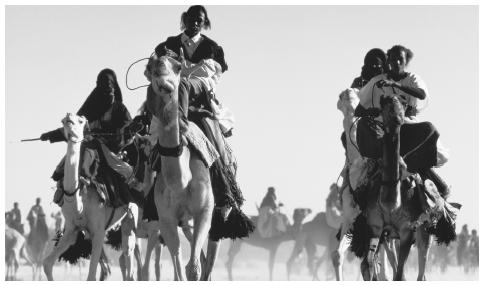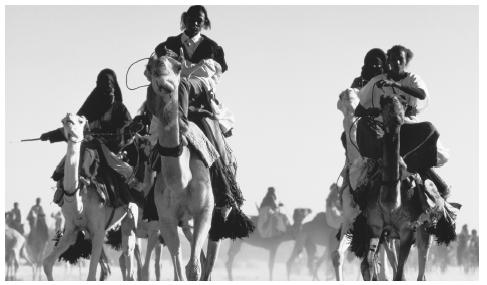This post discusses the history of Niger, colonial era, independence and further more explained the political history and the constitution of Niger.
EARLY HISTORY
Humans have lived in what is now the Niger from the earliest of times. 2 to 3.5 million-year-old Australopithecus bahrelghazali remains have been found in neighboring Chad. Considerable evidence indicates that about 60,000 years ago, humans inhabited what has since become the desolate Sahara Desert of northern Niger. Later, on what were then huge fertile grasslands, from at least 7,000 BCE there was pastoralism, herding of sheep and goats, large settlements and pottery.
Niger was an important economic crossroads, and the empires of Songhai, Mali, Gao, and Kanem-Bornu, as well as a number of Hausa states, claimed control over portions of the area. During recent centuries, the nomadic Tuareg formed large confederations, pushed southward, and, siding with various Hausa states, clashed with the Fulani Empire of Sokoto, which had gained control of much of the Hausa territory in the late 18th century. The area eventually became known as the Bornu Empire, which ended in 1893.
Read: POLITICAL HISTORY OF MOROCCO
COLONIZATION
In the 19th century, contact with Europe began when the first European explorers—notably Mungo Park (British) and Heinrich Barth (German)-explored the area searching for the mouth of the Niger River. Although French efforts at pacification began before 1900, dissident ethnic groups, especially the desert Tuareg, were not subdued until 1922, when Niger became a French colony.
Niger’s colonial history and development parallel that of other French West African territories. France administered her West African colonies through a governor general at Dakar, Senegal, and governors in the individual territories, including Niger.

INDEPENDENCE
On 11 July 1960 France agreed to Niger becoming fully independent. The French Fifth Republic passed a revision of the French Community allowing membership of independent states. On 28 July the Nigerien Legislative Assembly became the Nigerien National Assembly. Independence was declared on 3 August 1960 under the leadership of Prime Minister Diori. Subsequently, in November 1960 Diori was elected to the new position of President of Niger by the National Assembly. During his presidency, Diori’s government favored the maintenance of traditional social structures and the retention of close economic ties with France. He was re-elected unopposed in 1965 and 1970.
POLITICAL HISTORY
Politics of Niger takes place in a framework of a semi-presidential representative democratic republic, whereby the President of Niger is head of state and the Prime Minister of Niger head of government, and of a multi-party system. Executive power is exercised by the government. Legislative power is vested in both the government and the National Assembly.
1974 to 1990
On 15 April 1974, Lieutenant colonel Seyni Kountché led a military coup that ended Diori’s rule. Diori was imprisoned until 1980 and remained under house arrest (he died in April 1989 at the age of 72). The government that followed, while plagued by coup attempts of its own, survived until 1993. While a period of relative prosperity, the military government of the period allowed little free expression and engaged in arbitrary imprisonment and killing. The first presidential election was held in February 1993 and the first multi-party election as well (33 years after independence), and the first municipal elections only took place in 2007.
1990s
A transitional government was installed in November 1991 to manage the affairs of state until the institutions of the Third Republic were put in place in April 1993. While the economy deteriorated over the course of the transition, certain accomplishments stand out, including the successful conduct of a constitutional referendum; the adoption of key legislation such as the electoral and rural codes; and the holding of several free, fair, and nonviolent nationwide elections. Freedom of the press flourished with the appearance of several new independent newspapers.
1999 elections
Following another coup in April 1999, in which Maïnassara was killed, the MNSD-Nassara’s Tandja won the October 1999 presidential election.
In the October 1999 National Assembly Election, the MNSD won 38 of the 83 seats, forming a government under Hama Amadou with the support of CDS-Rahama’s 17 seats. The PNDS led the opposition with 16 seats, but the continued antagonism between Mahamadou Issoufou and Mahamane Ousmane meant that no other coalition was available. ANDP-Zaman Lahiya, a former split for the MNSD held only four seats. In 2002, this coalition was shored up when the ANDP joined the parliamentary majority coalition, the Alliance of Democratic Forces, leaving the opposition Coordination of Democratic Forces. Djermakoye joined the government as a Minister of State in November 2002, serving in that position until December 2004.
2004 elections
While Tandja easily retained the presidency against a second round challenge by Mahamadou Issoufou, the 2004 National Assembly elections were closer. The PNDS formed a coalition to contest the expanded 113 seats of the National Assembly, which also included the UNI (2 seats), the PPN (2), and the PNA-Al’ouma . With the PNDS’ 17 seats this coalition took 25 seats. The MNSD remained the largest party at 47 seats, be relied again on CDS-Rahama’s 22 seats to govern. A minor portfolios in the Council of Ministers were given to two smaller parties as well, the RDP-Jama’a (6 seats) and ANDP-Zaman Lahiya (5 seats). RSD-Gaskiya (7 seats) and PSDN-Alheri (1 seat) remained aloof of both blocs.
2007 PM crisis
In December 2004, Hama Amadou was again chosen as Prime Minister. Mahamane Ousmane, the head of the CDS, was re-elected President of the National Assembly. The new second term government of the Fifth Republic took office on 30 December 2004. In June 2007, a no confidence vote against the government led to the fall of the Prime Minister Hama Amadou and his ministers. Amadou was replaced by Seyni Oumarou, also of the president’s MNSD-Nassara party, leading to infighting within a portion of the party still loyal to Amadou. Broad changes were made to the Council of Ministers of Niger, with MNSD-Nassara continuing to take the majority of portfolios, but with the CDS, RDP-Jama’a, and NDP-Zaman Lahiya retaining Ministerial appointments.
Tazarce
In the run up to the 2009 elections (Presidential, Assembly, and Municipal), a movement to draft President Tandja for a third term appeared. Led by public figures of the MNSD outside government, the group took the name of Tandja’s 2004 re-election slogan, Tazarce: a Hausa word meaning “Continuity”. Through several well-funded and well attended public rallies in late 2008, the President remained silent on the calls for him to remain. The 1999 constitution made the serving of more than two term impossible, and the revision of that article illegal by any means. The Prime Minister Seyni Oumarou reiterated on 22 January that all scheduled elections would go ahead before the end of 2009.In March, during his meetings with French President Sarkozy, Tandja explicitly stated that he would not seek a third term.
Then, in early May 2009, when questioned by the press on his visit to Agadez to begin peace talks with Tuareg rebels, Tandja announced that “the people have demanded I remain. “His spokesman then outlined a plan in which a referendum could be held in mid-2009, not to amend the 1999 constitution, but to scrap it and begin work on a constitution of the Sixth Republic of Niger, which would contain no term limits for the President, and create a fully Presidential republic
On 26 March, within hours of the Constitutional courts statement, official media read out a statement that President Tandja had dissolved the National Assembly. Under the 1999 Constitution he is allowed to do once every two years, but he must call parliamentary elections with three months. This would mean the government of Niger would carry out scheduled parliamentary elections in September, two months early, and a referendum on a new constitution before Presidential elections which can take place no later than December, assuming the 1999 constitution is in effect.
2010 Coup
On February 19 a group calling itself the Supreme Council for Restoration of Democracy (CSRD) stormed the presidential palace during a meeting and took the president Mamadou Tandja hostage. Colonel Goukoye Abdul Karimou, spokesman for CSRD announced on state television that the country’s constitution had been suspended and all state institutions dissolved. It is believed that the president is being held in a garrison in the capital city with his resignation being sought.
Constitution
The constitution of December 1992 was revised by national referendum on 12 May 1996 and, again, by referendum, revised to the current version on 18 July 1999. It restored the semi-presidential system of government of the December 1992 constitution (Third Republic) in which the president of the republic, elected by universal suffrage for a five-year term, and a prime minister named by the president share executive power. As a reflection of Niger’s increasing population, the unicameral National Assembly was expanded in 2004 to 113 deputies elected for a 5-year term under a majority system of representation. Political parties must attain at least 5% of the vote in order to gain a seat in the legislature.


